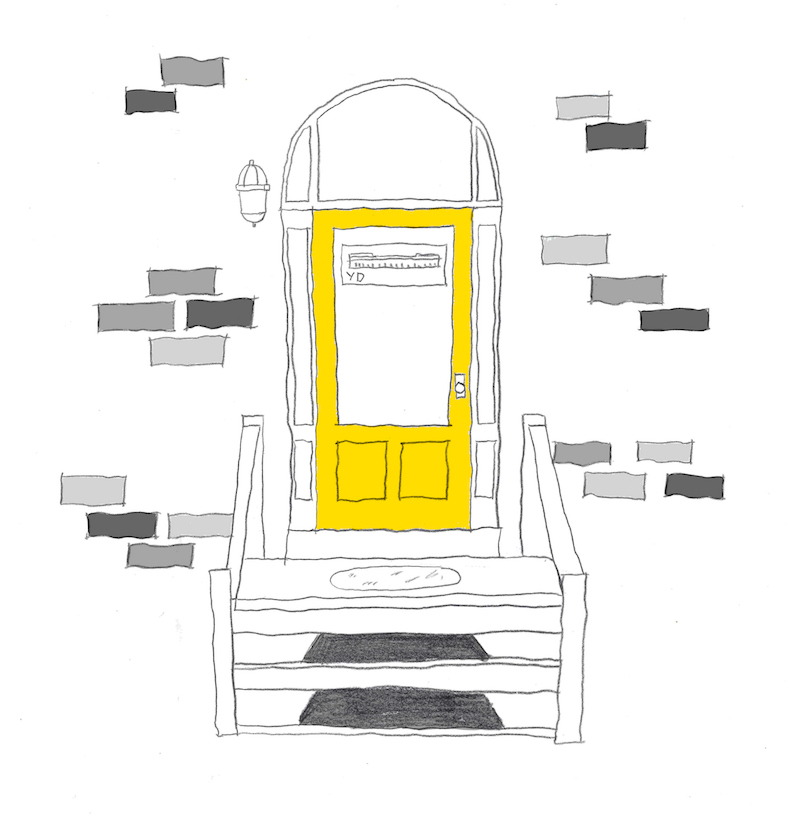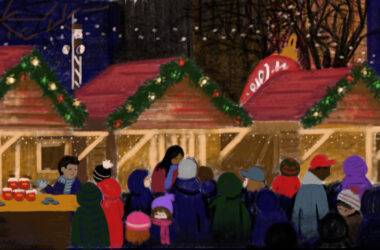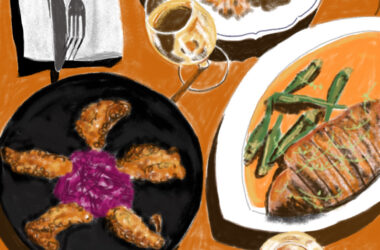Tucked away on the corner of Aylmer and des Pins lies a townhouse with a bright, eye-catching yellow door. Behind that door is an organization that has served McGill students and the Milton-Parc community for nearly a century, aptly named The Yellow Door. Through programs aimed at combatting social isolation, The Yellow Door is a neighbourhood staple, providing a collective space to meet the community’s needs.
The Yellow Door’s long history began in 1887 when the Young Christian Men’s Association (YMCA) of McGill was originally founded to promote Christian values in the McGill community. During the Quiet Revolution, however, the space became secularized, and its mandate focused on offering an inclusive space for members of the neighbourhood to gather. Since then, The Yellow Door has adapted its programing to accommodate the community’s changing demographic.
“[The Yellow Door is] an interesting place because it has changed many times over the years, and always in response to what the community needs,” Kaitlin Fahey, the current executive director at The Yellow Door, said. “[In the ‘60s], the community did not need a place for young Christian men. It needed a place for draft dodgers and for music and spoken word, so it became a folk scene. So, we [became] a coffeehouse, and that’s been going on for 52 years.”
Today, The Yellow Door’s main purpose is to function as a site of social discourse and combat urban isolation by bringing students and seniors together. A unique mandate—to serve the community by constantly evolving in offerings allows The Yellow Door to have such a wide range of activities. For example, in the 1970s, volunteers noticed how drug use across the city was affecting the community and founded a drop-in psychiatric clinic where Douglas Hospital doctors counselled young addicts. Similarly, The Yellow Door Elderly Project, now called the Generations project, was implemented to integrate Milton-Parc’s seniors with its younger generations.
“In the ‘70s, [our purpose] changed again in response to the community’s needs,” Fahey said. “Students [did] a survey of the seniors to see what they needed. The Yellow Door responded and developed the Generations program. It’s still going on today, and it tries to help the seniors in the community.”
Today, The Yellow Door runs four main programs: the Coffeehouse, the Generations project, the Intergenerational Wellness activities, and the Rabbit Hole Café. The Coffeehouse, the oldest folk music coffeehouse still operational in Canada, provides a space for music and spoken word performances every Friday. According to Fahey, the coffeehouse is an alternative venue where any performer can take the stage.
“The Coffeehouse is our open stage, [which we use] to serve the community,” Fahey said. “It’s nonalcoholic, all ages, and any performer can put their name in the hat and perform [anything from poetry to music]. So it really opens up a space for artists and musicians who may not be able to perform anywhere else.”
Similarly, the Generations program connects members of the Milton-Parc community by pairing younger volunteers, mainly McGill students, with seniors living in the area. Currently, there are roughly 250 volunteers, working with 300 seniors. Originally, the program aimed to prevent seniors from feeling isolated by dispatching volunteers to help with various day-to-day tasks including providing technological assistance and accompanying them to medical appointments.
“Seniors may not necessarily interact with students on a regular basis [and vice versa], so the program is very interesting [in that] when we partner them up, [they] get a different perspective on things,” Fahey said. “I remember being in university and everything feels so intense and dramatic. When you meet someone who’s 80 years old, you realize [that] there’s more to life beyond this year, that there’s other things you will experience in life.”
Intergenerational Wellness groups, which also bring seniors and students together, are held weekly at The Yellow Door. Offering activities that range from knitting and reading to meditation and woodcarving, these programs are free to all ages and aim to encourage neighbours to socialize with one another.
“The activities started organically,” Fahey said. “ Someone [would say], ‘I’d like to [share my skills with the community], and we would share our space with them, which is how [the wood-carving class] got started. This is what evolved into our current activities schedule.”
Many campus groups have developed programs at The Yellow Door in collaboration with members of the Intergenerational Wellness team. Sophia Seward, U3 Arts, is an executive director at the Fridge Door Gallery, a student-run art gallery with close ties to the Art Hive program at The Yellow Door. The Art Hive, part of the Intergenerational Wellness group, is a community art studio that provides free art materials, such as paints, pastels, and fabric, to interested members of the community. Seward emphasizes that The Yellow Door’s welcoming setting creates an inclusive space for a diverse group of people to come together and learn a craft.
“[Before joining the Art Hive], I’d never painted anything in my life, but I find that the environment at The Yellow Door really makes you feel safe,” Seward said. “And, it’s free, so you can really take a chance on something new [without worrying about financial constraints].”
Additional McGill groups, such as the McGill Coffee Co-op, have set up shop at The Yellow Door and added to the organization’s legacy of service and community building. Working in tandem with the Rabbit Hole Café, a bi-weekly vegan lunch service hosted by The Yellow Door, the Coffee Co-op provides low-cost beverages to students. Owen Dunkley, U3 Science and an executive at the Coffee Co-op, explained that the co-op was born out of a demand for sustainable, affordable options for Milton-Parc residents.
“Our coffee [and tea] are all free trade,” Dunkley said. “We share a space with the Rabbit Hole Café, and it’s a relaxing environment [….] If you look at the mandates for the Coffee Co-op and the Rabbit Hole Café, and The Yellow Door, they really do line up.”
With Première Moisson’s lease up for renewal in Redpath, Dunkley stresses the importance of providing the student population with affordable and sustainable options.
“So many people complain about how expensive Première Moisson is,” Dunkley said. “McGill can do better [to provide affordable coffee and food to students], and I think [that just] means opening up more spaces [like the Coffee Co-op and the Rabbit Hole Café].”
Accessibility, diversity, and inclusivity are all standards that The Yellow Door strives to accomplish in addition to giving back to the neighbourhood. The Yellow Door finds its mission even more important given its placement in Milton-Parc, where McGill students and older residents often form separate communities.
“[We live] in a funny neighbourhood, right?” Fahey said. “It’s mixed. You have a lot of senior residents [who’ve lived here for a long time] and a lot of students who come and go. I think it’s important to recognize that, even if you’re here for a short amount of time, this is your community, and if you’re interested in it, you can become a part of it either through joining activities […] or volunteering your time.”







